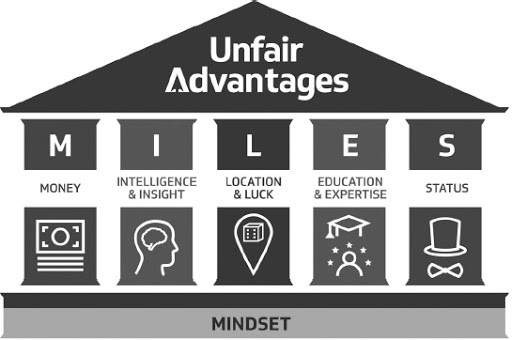After having read The Unfair Advantage by Ash Ali & Hasan Kubba, I thought about their framework they explained, the 'MILES framework'. There are 5 categories of unfair advantages, which makes up the MILES framework – Money, Intelligence & Insights, Location & Luck, Education & Expertise, Status.
The book explains how you can identify these advantages in your own life and how it isn't just down to luck or being born with a silver spoon in your mouth. Instead, the MILES framework helps you identify how you can help position yourself to position yourself to take advantage of luck.

Money
Money is the capital you have, or that you can easily raise. For example, if you're looking to build a start-up company, there are two aspects where money is a factor:
- Runway time - time you have until you run out of money and are forced to shut down
- Burn Rate - how much money you are losing every month
In the strange world of startups, the time you have until your startup runs out of money and is forced to close down is called your runway time. You could have four months of runway time, or you could have one year. It depends on how much money you have and how much money you’re ‘burning’. Your ‘burn rate’ is how much money your startup is losing every month. If your startup has £5,000 in the bank, and your burn rate is £1,000 a month, then you have five months of runway time.
- The Unfair Advantage
Intelligence & Insights
There are different types of intelligence - ‘nerds’, social, and emotional intelligence, as well as creativity. Intelligence could be just being a 'book smart' or could be someone that has specific skills in a particular area like computer science.
Insight is where someone has knowledge & experience of something like an existing market or product, etc. Having insight means having a better ability to find a gap in the market, or know where to concentrate on finding a solution to a problem in the market. An inefficiency of an existing product, or a problem people face in their everyday lives.
The key here is to always find a problem first, before developing a solution. Instead of coming up with a solution, then forcing your solution into the problems you have brainstormed. This helps to ensure there is a good product-market fit.
Location & Luck
This can give you access to luck.
People often say that luck is about “being at the right place, at the right time.” That said, luck is not random. You can create your own luck by:
- Maximising your chance opportunities
- Trust your gut feeling, especially when you have prior experiences
- Expect luck to happen, it tends to be a self-fulfilling prophecy
Luck is best viewed as a formula:
LUCK = PREPARATION + OPPORTUNITY
Luck is quite predictable. If you want more luck, take more chances. Be more active. Show up more often.
- The Unfair Advantage
Education & Expertise
- Knowledge: Getting good school grades, going into higher learning. and specialising in a course. This gives you a more in-depth understanding of a particular field
- Network: Gain access to people and places (LinkedIn is great for this)
- Signaling: Increase credibility and improve personal branding
Expertise is when you have a good understanding of something specific or niche. Normally, this is a process learned by researching online, reading subject matter books, or working with other people that are already expert in the field. Education can be a strong foundation in school as it is a multi-disciplined education but failing at school isn't the end of it all. Building expertise in a more concentrated field often carries more importance.
"An expert is somebody who obtains results that are vastly superior to those obtained by the majority of the population."
- Professor Fernand Gobet
Status
Having status could also be your unfair advantage. Most people tend to only think about social status, network size, family background and privileges, but don't forget that there is also an inner status you need to develop, your self-confidence and self-esteem. Develop your own inner status first - it's a powerful way to boost your outer appearance. This links to the idea in Chapter 1 of Jordan Peterson's - you can read about lobsters here... https://petenicholson.co.uk/what-we-can-learn-from-lobsters/
❤️ Enjoyed this article?
Forward to a friend and let them know where they can subscribe (hint: it's here).






